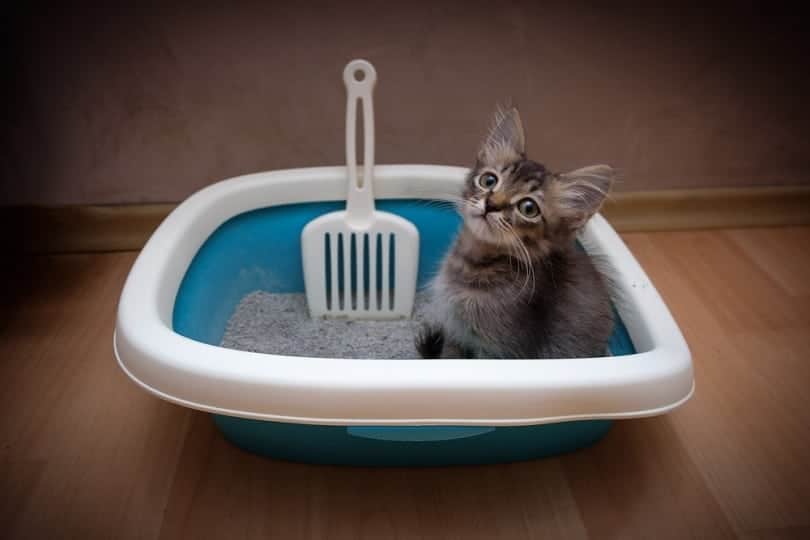Bringing home an adorable new kitten is an exhilarating time. Kittens are incredibly energetic and never fail to entertain you with their antics. But if you’ve never owned a cat, it can also feel like a huge responsibility. Check out our eight must-know tips for taking care of your kitten and ensuring they grow up as strong and happy as possible.

The 8 Tips to Take Care of Your Kitten
1. Stock Up on Supplies
Kittens might be small, but they need plenty of supplies! It makes sense to get the basics before your kitten arrives. That way, you know you’re covered for at least a few weeks. If your kitten ends up needing new equipment or toys after that, you’re not going to feel rushed into buying them. Before you bring your kitten home, we recommend investing in:
- Food and water bowls
- Collar
- ID tags
- Harness and leash
- Cat carrier
- Cat beds
- Grooming tools
- Scratching post
- Toys

2. Make Sure You Have Enough Kitten Food
Most kittens travel to their new homes when they’re 8 to 12 weeks old, and at that time, they’ve been fully weaned onto solid food. If you can, it’s a good idea to find out what food the breeder or shelter uses. Maintaining the same diet can minimize the chances of your kitten developing an upset tummy as they move to their new home.
Always choose a brand approved by the Association of American Food Control Officials for the growth and development stage of a cat’s life. It contains all the nutrients, vitamins, and minerals your kitten needs to thrive.
If you do decide to switch foods, make the transition to the new food slowly over the course of at least 1 week. Start adding just a spoonful of the new brand to the existing food, and gradually increase the amount until you’re feeding just the new brand.
Kittens up to 6 months old should be fed four times per day. You may decide to free-feed a dry kibble that your kitten can snack on in between meals of wet food. By 7 months old, you can reduce meals to two times per day. By 1 year old, you can transition your kitten to an adult cat food.
3. Train Your Kitten to Use the Litter Box
Most kittens learn how to use their litter box with minimal fuss. As they get used to their new home, expect them to have a few accidents. If your kitten is taking a little time to adjust, place a few litter boxes around the house so they’re never far from one if they need to go.
Heap plenty of praise on your kitten and provide treats when you see them using their litter box properly.

4. Give your kitten time to adjust
Moving away from their mother and siblings can be a huge adjustment for your kitten. If they’re moving to a new home with a sibling, the adjustment can be a little easier, and the kittens will rely on each other for support and comfort. If you’re bringing home a solo kitten, be prepared for them to need more attention and comfort from you.
Spend plenty of time socializing and playing with your kitten, but let them set the pace. If they’re nervous around new people or another pet, keep the meetings short and offer your kitten plenty of treats and praise.
Kittens also tire out easily, and sleeping is a way of processing all the new information they’re learning. Kittens sleep between 16 and 20 hours per day, so make sure you allow your kitten plenty of quiet time to catch those z’s.
5. Take Your Kitten for Their Health Check
Schedule your kitten’s first health check for around 1 week after you bring them home. Your vet will give them any vaccinations if they haven’t had them and carry out a general health examination. They may also prescribe medication for parasites or fleas if necessary.
Getting your kitten used to vet visits is a great way to help them be more comfortable during future appointments. It’s also an excellent opportunity to ask your vet any questions about nutrition, socializing, or anything else you’re wondering about.
6. Socialize Your Kitten
If you want your cat to be outgoing and well-adjusted as an adult, socializing them while they’re still a kitten is crucial. Once your kitten has settled into their new home, consider ways to socialize them as much as possible. Get them used to being brushed, having their nails trimmed, and taking a bath, and you’ll find that caring for them is easy and stress-free.
Invite friends over, and encourage them to meet your kitten but don’t be shy with the treats! If you have dogs and other cats, introduce your kitten to them slowly and allow them to get to know each other at their own pace. Allow your kitten time to rest between these socializing sessions, and remember that they still need plenty of sleep and time to process the new sights and sounds.
- Related Read: How to Get an Older Cat to Accept a Kitten: 6 Easy Steps
7. Use positive reinforcement
As responsible kitten owners, we must find the best way to train our kittens. Positive reinforcement helps your kitten learn which behaviors they get rewards and praise for. They’re then more likely to keep doing it!
If you don’t want your kitten to get up on the kitchen counter, don’t shout at them when they’re up there, but instead, redirect them to their toys or a scratching post and heap praise on them while they’re there instead. They’ll soon learn that it’s a good place to be. It can be fun teaching your kitten new tricks, too!

8. Schedule Plenty of Playtime
Kittens love to sleep and eat, but they also love to play! Between eating and sleeping, your kitten will spend most of their time playing. Make sure they have a wide variety of toys. Some can be interactive, like fishing wand toys that you can wave around for them, and others are ones that your kitten can play with by themselves if they wake up in the night, like kicker toys.
Final Thoughts
Although some kittens are slightly easier to take care of than puppies, they require the proper care to live long, happy lives. Providing food, toys, and supplies is essential, but you must also give them attention and play with them every day. Kittens learn most of their socialization skills when they’re incredibly young, and a stable environment with caring owners will help them become well-balanced, friendly adults.
See also:
- How Long Can You Leave a Kitten Home Alone? What You Should Know!
- Will Sibling Cats Mate? Ethical Issues & Prevention
Featured Image Credit: Serita Vossen, Shutterstock





